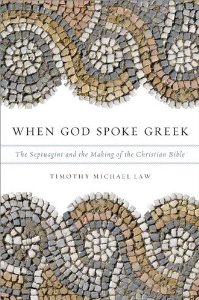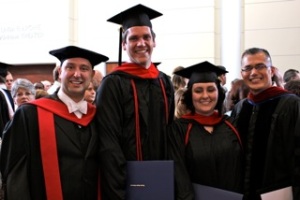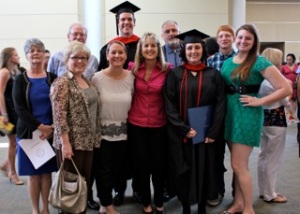Happy Monday everyone! I’m extremely excited to be participating in a blog tour of T. Michael Law’s new book ‘When God Spoke Greek: The Septuagint and the Making of the Christian Bible’ organized by Brian LePort over at Near Emmaus. I received a copy for review from Oxford University Press and will be reviewing chapters 9 & 10.

When God Spoke Greek is a narrative history of the Septuagint, the Greek version of the Old Testament. Law’s goal in writing this book is to make the Septuagint more accessible to both laity and academics, while highlighting its important role in the development of the Christian Bible. To read more about the preceding chapters (1-8), see the links below.
Chapter 9, The Septuagint in the New Testament
Following his discussion in chapter 8 over the Septuagint available to the New Testament authors, Law next takes a more in depth look at some specific citations found in the NT as well as the method and manner in which they are used by the NT authors. Beginning with the Gospels and Acts, Law provides several examples of OT quotations that demonstrate dependence on the Septuagint text or a Septuagint revision. Indeed Law concludes that “most if not all of the citations in the New Testament are not in any way strictly dependent on the Hebrew,” (115).
There area several instances in which the Septuagint translation emphasizes a different theological point than the Hebrew text. Although it is impossible to know for sure whether an author intentionally chose one text over the other, Law suggests the Greek translation was often more favorable to the NT authors theological emphases. One such example is Luke’s use of the Septuagint text of Amos 9:11-12 in Acts 15:16-18.
“In the context of the Hebrew version, the prophecy is centered on the benefit to the people of Israel: the people are to inherit the remnant of Edom and all the other nations. In the Septuagint, the focus has shifted, and the Gentiles are seeking out the Lord, which becomes very useful in Luke’s hands since he wants to legitimize the Gentile mission,” (104).
Law then moves on to Paul who “most often, perhaps always, preferred the Greek” when quoting the OT as “Paul finds the Greek forms of scripture more suitable for his intention to announce God’s message to the Gentiles,” (105). On more than one occasion it appears that the Septuagint reading of a text is crucial to Paul’s argument. After spending some time on Paul, Law briefly looks at the Septuagint in the remaining NT books, the most interesting example coming from Revelation (2:26-27, 12:5, and 19:15) in which the author quotes the Septuagint text of Psalm 2:9 “where the Greek translator has misunderstood the Hebrew verb or read a different Hebrew text,” (114). As Law points out,
“This example is particularly important since it contains an obviously erroneous reading of an Old Testament passage that was left uncorrected by the New Testament writer,” (115).
That’s definitely something to chew on for a while. Chapter 9 ends with a brief discussion on why the use of the Septuagint in the NT is important. Law concludes,
“It would be worth the modern reader’s time to ponder the significance of the New Testament author’s use of the Septuagint, to consider what theological emphases would not have been possible if the authors were using the Hebrew Bible alone,” (116).
I agree… and I am pondering. Would the New Testament be any different if the authors had not had the Septuagint as a source?
My only issue with this chapter was the lack of Greek and Hebrew text. Law provides several examples in which the NT reflects the Septuagint Greek over the Hebrew MT and yet he only provides English translations for comparison. While this is a non-issue for many reading on the popular level, Greek and Hebrew readers will likely find this frustrating.
Chapter 10, The New Old Testament
In chapter 10 Law describes the development of the New Old Testament noting that the early Christian “Bible” was not a fixed collection of books as we now have it, but rather “a loose collection of texts” (117). When early Christians who viewed themselves as the “New Israel” soon realized the Greek Jewish texts they were using were different from the Hebrew scriptures used by their Jewish contemporaries, the problem was easily resolved. It was obvious to most early Christians that as the New Israel, God had provided a new word in the form of the Septuagint.
“Most early Christian scholars… argued or at least assumed that the Greek Septuagint was the new word of God for the church, a divinely inspired text that God had delivered for the sake of bringing the message of Christianity to the world…” (118).
How did this new word become the New Old Testament? The process of delineating a fixed set of books came about for practical reasons. In addition to the invention of the codex (or book), the church gave priority to some books over others based on apologetic reasons. Early Christians were concerned with settling disputes with Jews as well as pointing to messianic prophecies in the Greek Jewish scriptures. Law makes an important distinction here between “canon” and “scripture”:
“Scripture signifies only an ‘authoritative writing in a religious community.’ Canon, on the other hand, is a catalog, a list of scriptural writings. To put it simply: there can be no canon without scripture, but scripture can exist without a canon,” (121).
Thus we shouldn’t automatically assume that if a text was not included within a canon that it was not considered to be scripture. The process of canonization would continue for several centuries during which different groups and the early theologians would advocate for different sets of books, including those that now make up the Apocrypha. These books eventually fell out of favor among the western church and Law ultimately pits the fault with Jerome who is discussed in more detail in chapter 13.
Some Final Thoughts
When God Spoke Greek is an easy and enjoyable read. Law’s passion and proficiency are evident as he skillfully narrates the rich history behind the Septuagint and the complex text we now call the Bible. He provides definitions and clarifications on terms when needed which is sure to be appreciated by those new to the Septuagint and/or biblical studies, as well as those already aware of the complexities involved in discussing the Septuagint… I mean the LXX… I mean the Old Greek… and so on.
Law addresses the common misconceptions many of us have or have had at one point in our reading of the Bible. Moreover, this book offers a thoughtful correction to the western church’s centuries of neglect of the Septuagint, a correction that is sorely needed.
I appreciated Law’s use of the feminine pronoun instead of the usual masculine pronoun when discussing hypothetical or generic persons, such as here in the beginning of chapter 4:
“In biblical translation, for example, the richness of Hebrew poetry cannot be communicated in ancient Greek or in modern English, so even when the meaning may not be too different, if at all, the color and depth usually is. Inevitably, however, the translator will be faced with an obscure expression in the source language; assuming she understands it she may nonetheless find no acceptable counterpart in her language,” (33).
I rarely see the use of feminine pronouns by male authors; it was a refreshing change. If you are familiar with me and/or my blog you know that language and gender are two of my favorite topics so I couldn’t not mention this minor detail.
I think the greatest benefit of this book is the questions that it provokes its readers to ask. What does it mean for us today that the Septuagint was seen by many in the early church as inspired? What does it mean for Paul to have ‘misinterpreted’ an Old Testament passage, whether intentionally or unintentionally? If the NT authors were reading some of the apocryphal books, which in turn played some role in shaping their theology, why aren’t we reading these texts as well? Why is finding the so-called ‘original text’ such a priority for many of us today if it was not a priority for the NT authors (86)?
For those interested in learning more about the Christian Bible When God Spoke Greek is a great place to start. It would also be a great accompaniment to a more thorough introduction for students of biblical studies.
A huge thank you to Brian LePort at Near Emmaus for organizing this blog tour. Thank you again to Oxford University Press for the review copy. Here are the links to the other blogs in the tour:
JOEL WATTS (Sunday, July 21st, http://unsettledchristianity.com/)
1 Why this Book?
2 When the World Became Greek
ANDREW KING (Tuesday, July 23rd, http://blogofthetwelve.wordpress.com/)
3 Was There a Bible before the Bible?
4 The First Bible Translators
KRISTA DALTON (Thursday, July 25th, http://kristadalton.com/blog/)
5 Gog and his Not-so-Merry Grasshoppers
6 Bird Droppings, Stoned Elephants, and Exploding Dragons
ABRAM K-J (Saturday, July 27th, http://abramkj.com/)
7 E Pluribus Unum
8 The Septuagint behind the New Testament
Coming soon…
AMANDA MacINNIS (Wednesday, July 31st, http://cheesewearingtheology.com/)
11 God’s Word for the Church
12 The Man of Steel and the Man who Worshipped the Sun
JAMES McGRATH (Friday, August 2nd, http://www.patheos.com/blogs/exploringourmatrix/)
13 The Man with the Burning Hand vs. the Man with the Honeyed Sword
14 A Postscript









